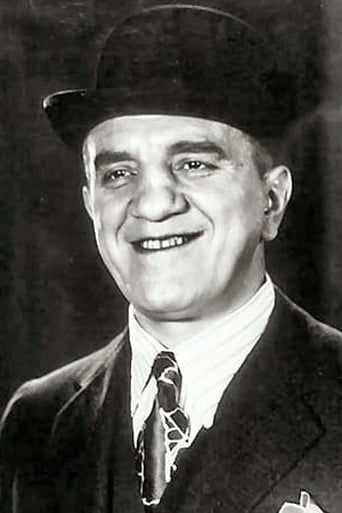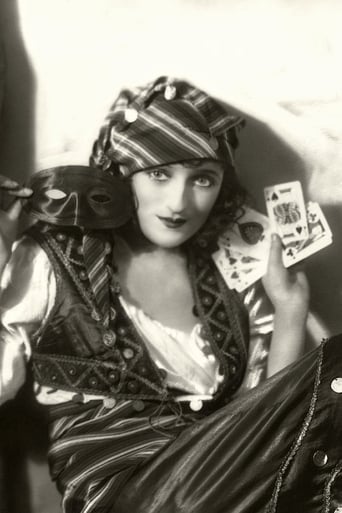Alicia
I love this movie so much
Acensbart
Excellent but underrated film
Rio Hayward
All of these films share one commonality, that being a kind of emotional center that humanizes a cast of monsters.
Aneesa Wardle
The story, direction, characters, and writing/dialogue is akin to taking a tranquilizer shot to the neck, but everything else was so well done.
kryptoman102
I guess I am in the minority. I thoroughly enjoyed the movie, an early look at mutiny and class disparity. I disagree with other reviewers, in that I didn't find myself sympathetic to either side. I also disagree that somehow the movie takes a turn toward the rich side of the argument. I find both sides were equally abominable even and up until the end. It is a very interesting look at an issue that is very poignant even in 1930.The rich are still feeling their superiority and the workers are merely asking for their equal treatment. The workers are asking for respect, to not be called "beast" and "monster". The rich do not seem to understand that even at the end. It's unfortunate that many people cannot see that this is all that they want. Both sides are equally duplicitous through the entire movie.
max von meyerling
Written by Hollywood Ten screenwriter John Howard Lawson, this crackles with class resentment. The blasé privileges of wealth: i.e. Going to the office at eleven and working furiously until noon, are thrown into a maelstrom of class war. It starts with the usual, per the period, bunch of night club swells dressed to the nines, blithely decide to take a yachting journey to San Francisco. While they talk about the crew in disparaging terms, the steward seethes at being ordered about, being blamed for their faults, etc. While the rich lounge on deck drinking highball, the crew is restricted to the heat of below decks. A storm, which the rich welcome for a bit of excitement, seriously damages the ship, giving the steward the opportunity to mutiny and take over the ship reversing the situation. Its clear that Lawson was writing a parable of Class War. Its always been my hypothesis that early talkies became unpopular not because of their crudeness because of the early recording equipment, but because the subject matter, mostly 1920s theater, was made instantly passé by the depression. Men in white tie at the country club dance, fluttering flappers trying to decide between one vapid stockbroker or another. These became chokingly irrelevant in the depression. Here this begins in the same way but gets down to the ugly truth quite quickly. That this wasn't popular at the time is obvious. The O'Neill type ending doesn't help. Lawson was to take a lesson from this and spread Communist propaganda in more subtle ways later in his career. He was, however, just as doctrinaire, becoming the head of the Communist Party cell in Hollywood.
boblipton
1930 was the year that MGM went to all-talkie production and this movie demonstrates their lack of ease with the new medium. In addition they saddled themselves with a lot of sequences shot on the water, always a risky proposition -- although the ship was likely at the docks.Meanwhile this production is afflicted with all the stereotypical problems of early sound productions: a static camera, unnatural-sounding sound with a lot of hiss and badly directed dialogue. Even if you discount these problems, this story of how brutish purser Louis Wollheim seizes control of a yacht after it is wrecked in the storm lacks interesting characters. Each character can be defined in a sentence. The interesting parts of the movie are the sailors trying to deal with the storm as it swamps the yacht; and Kay Johnson checking on the badly injured Conrad Nagel. Those, however, are clearly shot MOS. The rest of the movie makes use of cuts where a moving camera would have been better.MGM clearly figured this movie to be a greater success than it turned out and its failure pretty much ended the career of Kay Johnson and knocked Conrad Nagel out of the leading man category. Louis Wollheim survived and prospered off his next movie, the great ALL QUIET ON THE WESTERN FRONT. If the MGM brass thought this movie would propel them firmly into the sound era, they were sadly mistaken.
drednm
Early talkie could have been good but the hideous performance of Louis Wolheim and bad direction kill this effort despite some good work by Kay Johnson, Zeffie Tilbury, and Carmel Myers. Even Conrad Nagel is not all that bad, but the endless monologues of Wolheim kill any tempo this film might have had plus he's just plain bad. This is one of several talkie flops that ruined Nagel's starring career; this is also Myers' first major talkie. Too bad. She was interesting. Johnson has a couple of dynamite scene, and Tilbury (famous as the grandmother in The Grapes of Wrath a decade later) is awfully good as Lady Daley. Holmes Herbert, Jack MacDonald, and Ivan Linow co-star.




